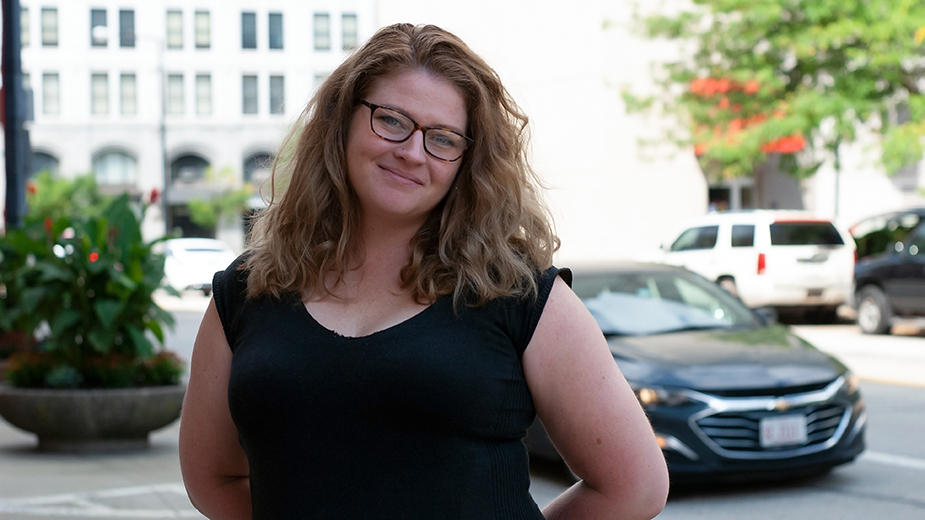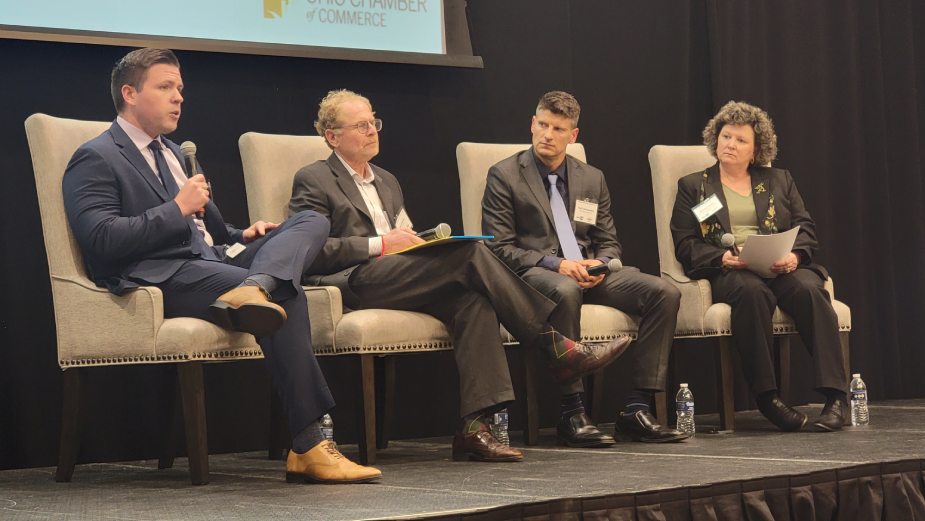YWCA Gives Mom, Son a Second Chance
YOUNGSTOWN, Ohio – Walking through the doors of the YWCA saved Madeline Burdick’s life and gave her back parts of herself she didn’t realize were missing.
She is stable, happy and healthy – three words Burdick now uses to describe herself – thanks to the YWCA of the Mahoning Valley and the support it has given her over the last two years. YWCA offers housing options for no-, low- and moderate-income women and families at sites in Trumbull and Mahoning counties.
“I wasn’t living my life. I was going through the motions every day and surviving but now I’m living,” she says. “I’m actually enjoying life: I’m laughing. I’m having fun. I didn’t know that was possible.”
Burdick was working as a supervisor for Trumbull County Transit, making what she describes as “very good money,” when the company lost funding. Her pay was cut and eventually her position was eliminated. The pandemic made the job search impossible and Burdick lost her housing.
Burdick could fit all of her and her son’s belongings in her old cheerleading duffel bag she kept in the trunk of her car. Burdick and her 9-year-old son, Samuel, became homeless.
Samuel stayed with Burdick’s mother while Burdick tried to find housing. At a point of desperation, Burdick got drunk and checked herself into rehab. She knew from an earlier stay that she would be guaranteed housing.
“I was in rehab in 2016 for alcoholism and they found me housing. So I knew if I checked in, they weren’t just going to kick me out on the street. I was homeless. I didn’t have any legal problems. I didn’t lose my son. My whole life spiraled out of control.”
The day before she was released, Burdick was referred to the YWCA and eventually placed into a transitional housing program.
“I’m sitting there terrified because ‘If we don’t get this, where are we going tonight?’ This is like stuff you see in a movie or something,” Burdick recalls from her first meeting with her YWCA case manager, Joy Smith.
That night, the YWCA got Burdick and her son into a furnished two-bedroom apartment. All Burdick had were the clothes on her back and the belongings she had in her duffel bag. The YWCA supplied the rest.
“They went out and bought us new pillows, sheets, towels. They gave us dishes,” Burdick says. “We had all our basic necessities covered.”
HOMELESSNESS CRISIS
Colleen Kosta, the Mahoning County Homeless Continuum of Care coordinator, says that homelessness is on the rise both here and across the nation. No state has an adequate supply of affordable rental housing for the lowest income renters, according to the National Low Income Housing Coalition.
Of the 44 million renter households in the United States, 11 million have extremely low incomes – that is, incomes at or below the poverty level or 30% of the area median income, whichever is higher.
In Ohio, there are 443,717 extremely low-income renter households and only 189,172 affordable and available homes.
Experts expect that number to rise based on current economic trends, Kosta says. While the outlook might appear grim, she says the Homeless Continuum of Care and partnering agencies have a possible solution – but they’re missing a vital piece.
“We have had an increase in money through the American Rescue Plan. A lot of state officials are looking at how to use that money wisely and a lot of people want to invest in housing and rental assistance for persons experiencing homelessness,” she says. “But we don’t have enough landlords or development or properties for people to go into. So, we have a solution but we are missing a big piece of it, which is landlord engagement.”
ARP provided $5 billion to help individuals or households who are homeless, at risk of homelessness, and other vulnerable populations, by providing housing, rental assistance, supportive services, and non-congregate shelter, to reduce homelessness and increase housing stability across the country.
Youngstown received $2.52 million, according to the U.S. Department of Housing and Urban Development.
In May, leaders of the Catholic Charities Regional Agency, the Mahoning County Homeless Continuum of Care and the Mahoning County Mental Health and Recovery Board issued a plea to local landlords.
The agencies hosted a meeting to inform landlords of the incentives attached to renting to their clients but MCMHRB executive director Duane Piccirilli says the meeting wasn’t as successful as hoped and only two landlords attended.
The incentives include the Emergency Housing Voucher (EHV) Program through the Youngstown Metropolitan Housing Authority with help from the Homeless Continuum of Care. YMHA was awarded 41 rental assistance vouchers for homeless individuals and families. Kosta says the vouchers don’t have an end date and guarantee rent for landlords as long as the individual is in the program. Landlords will also receive a one-time $750 payment for renting to an individual or family through the EHV program.
The permanent vouchers are for people who are homeless, domestic violence survivors, human/sex trafficking survivors and/or victims of stalking, Kosta says.
Kosta says the agencies have trouble finding landlords to accept EHV recipients because of a lack of housing and resistance from property owners who are apprehensive about renting to people who fall into the qualified categories. Kosta wants to assure landlords that individuals chosen for the voucher program are suitable tenants.
Nancy Voitus, executive director of Catholic Charities Regional Agency, said her agency offers a one-time payment equal to three times the rent asked for landlords willing to rent to her clients. Catholic Charities is not asking landlords to rent to tenants they’re uncomfortable leasing to, she says, and tenants are accepted at the landlord’s discretion.
Piccirilli says that most people are closer to homelessness than they think. Burdick was one of the many people only a few missed rent payments away from losing everything.
“A lot of people are one paycheck away from being homeless. They lose their job for some reason. Or a family member gets sick and doesn’t have health care. There’s a lot of reasons,” Piccirilli says.
“That’s sort of how a lot of people are living now,” he continues. “And so this will help get them back on their feet and get them more stabilized.”
A SECOND CHANCE
Burdick hit another low before becoming stabilized. But the YWCA’s Smith, known as “Miss Joy” to Burdick and her son, thought that Burdick would be a great candidate for the Scattered Sites program.
YWCA helps in providing scattered site housing at places throughout Mahoning County. These permanent rental houses provide supportive services to low-income and homeless families with minor children and a disabled parent who lives in the home.
Burdick is diagnosed with bipolar disorder, which is considered a disability under the Americans with Disabilities Act.
In December 2020, Burdick was preparing for the change from transitional housing to a more permanent situation when Samuel was taken from her because of a report Samuel’s estranged father filed. She didn’t see or speak to her “best friend” – as she calls her son – until March 2021.
“I was in the lowest, darkest place of my life,” she recalls, adding that she started drinking again until one day something clicked.
Burdick called Smith and told her she was ready to get her life back. She moved into another apartment in the building that she had to furnish herself, which she says was a daunting task she managed to complete.
She got a job at Save A Lot and was promoted to manager within a few weeks. She lined up a babysitter for Samuel for when she got him back. All of the pieces were falling into place, she says.
“I got him back and things have been great. We just keep moving up, up and up,” she says.
Burdick has maintained her sobriety since then. Now she receives a monthly naltrexone injection to help her stay alcohol-free. The medication blocks the “feel-good” response alcohol causes. She says it’s a small price to pay to be sober for herself and her son.
“I did this because of my son, who has autism. He has these little things in his brain that he can’t understand, that when he tries to tell me I can’t even understand. So why am I going to do something to mess with him even more? Why would I do that? As a mom, that’s crazy,” she says.
Burdick and her son moved into another apartment on the North Side in August, one that she says finally feels like home. She says she takes pride in her new residence and
making it a home for herself and Samuel.
She estimates that she pays 30% of rent and the YWCA subsidizes the rest. Were something to happen and she couldn’t pay rent, she says the YWCA would step in and find the funds to pay her landlord.
Burdick is happier than ever, she reports – even before she lost her job in 2020. She now has the time to focus on being a good mom and taking care of herself and her health – something she didn’t have the mental space on which to focus when she was just trying to get through the day.
She credits a large part of her happiness and her stability to Smith who is now a pillar of support for her and Samuel.
“I probably would have lost Samuel at that point because I probably would have kept drinking during this. But I saw that I needed to climb up because I was surrounded by nothing. So, I had to go up,” she says. “I have Miss Joy now. She and this program are my safety net. I don’t want to have to rely on it but I know it’s there. But it’s still me. I still have to keep doing what I have to do. I still have to keep pushing forward. Because the safety net is not supposed to be there forever.”
BREAKING THE STIGMA
Leah Merritt, executive director of the YWCA, says there are other success stories like Burdick’s. People in the program just need a little stability, she says, and a chance. A stigma remains that follows unstably housed individuals. Society tends to focus on the small percentage who cause problems for landlords.
“We’ve had people that enter the program homeless that just need some stabilization and are now out of the program and self-sufficient on their own,” Merritt says.
“If you talk to any of the landlords that any of us work with, you’re going to find that they like to work with us because they’re guaranteed that rent on the fifth of the month or whatever the agreement of that lease is going to be,” she says. “And we are going to follow up and be that liaison with the person occupying the home.”
Vince Brancaccio, CEO of the Help Network, stresses the amount of support agencies give these individuals.
“There’s an advantage for a landlord to rent to one of our programs – because we are going to follow up. You’re going to have a person that’s going to go to that home or that apartment, at least monthly, and make sure they’re taking care of their home. Make sure they’re paying their bills and make sure they’re being a good neighbor,” Brancaccio says.
But Lee DeVita, program coordinator for the MCMHRB, warns that if property owners are not found soon, the funding might be taken away.
“They [HUD] always want to see outcomes. If we have so many positions available but we’re not utilizing those funds in time, the money could go back into the pool of money that HUD has,” DeVita says. “We want to keep it here in Mahoning County and use it for the individuals that are here and need the assistance.”
Property owners interested in the program can contact Lee DeVita at Lee.Devita@mahoningcountyoh.gov or call 330 746 2959.
Pictured at top: Madeline Burdick says she now lives in an apartment that finally feels like home.
Copyright 2024 The Business Journal, Youngstown, Ohio.



